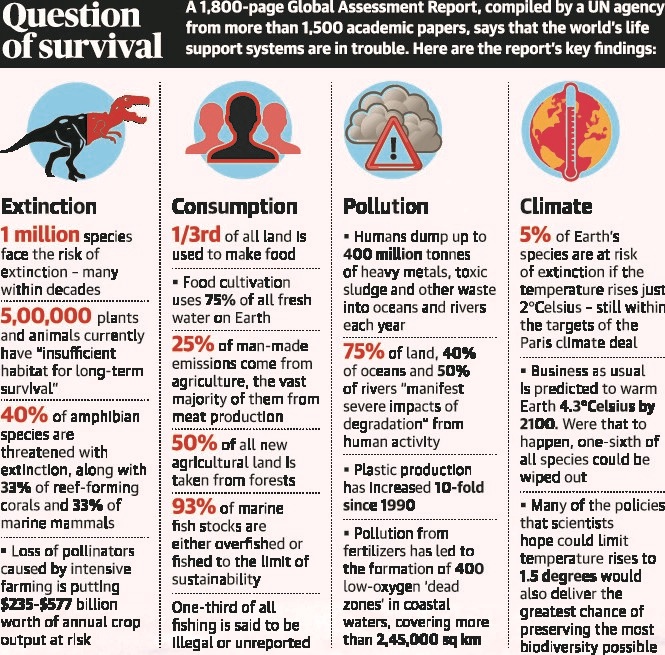
1 million species at risk of extinction: UN
Why in news?
- In the report on the damage done by modern civilization to the natural world scientists said that, relentless pursuit of economic growth, twinned with the impact of climate change, has put an unprecedented one million species at risk of extinction.
- The key message: business as usual has to end.
What does the report say?
- Need to embrace a new post-growth form of economics:(1) Study suggests that, if it is to avert the existential risks posed by the mutually-reinforcing consequences of pollution, habitat destruction and carbon emissions, world may need to embrace a new “post-growth” form of economics.(2) Known as the Global Assessment, report found that up to one million of Earth’s estimated eight million plant, insect and animal species is at risk of extinction, many within decades.
- Farming and fishing as major drivers with the current rate of species extinction tens to hundreds of times higher than the average over the last 10 million years.
- Climate change caused by burning the coal, oil and gas produced by the fossil fuel industry is exacerbating the losses.
- 3-year review:(1) The Global Assessment contained a litany of estimates made after a three-year review of some 15,000 scientific papers.(2) These papers showed that the profound impact of the rise of a globalized industrial society on the planet over the past half century.
- Range of risks:(1) Disappearance of insects vital for pollinating food crops.(2) The destruction of coral reefs that support fish populations that sustain coastal communities and the loss of medicinal plants.(3) The report found that the average abundance of native species in most major land-based habitats has fallen by 20%, mostly since 1900.(4) Threatened list includes more than 40% of amphibian species, 33% of reef-forming corals, and more than a third of all marine mammals.

Way ahead
- It would be possible to start conserving, restoring and using nature sustainably only if societies were prepared to confront vested interests committed to preserving the status quo.
- The report also tells us that it is not too late to make a difference, but only if we start now at every level from local to global.
- It must be done by transformative change that is fundamental, system-wide reorganization across technological, economic and social factors, including paradigms, goals and values.
- Profound economic and social changes would be needed to curb greenhouse gases quickly enough to avert the most devastating consequences of a warming world.
Conclusion
- Only a wide-ranging transformation of the global economic and financial system could pull ecosystems that are vital to the future of human communities worldwide back from the brink of collapse.
- The essential, interconnected web of life on Earth is getting smaller and increasingly frayed.
- This loss is a direct result of human activity and constitutes a direct threat to human well-being in all regions of the world.
Source
The hindu

